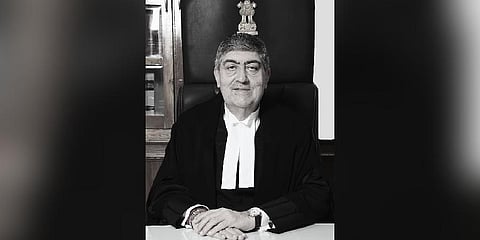

NEW DELHI: As a society, people must have tolerance for each other and it is time for the human species to learn to live with each other "so that the world becomes a large place and not a small place to live", Justice Sanjay Kishan Kaul said on Friday on his last working day.
Supreme Court held a ceremonial bench for the second seniormost judge Justice Kaul to bid him farewell. He is set to retire on December 25, this year. The Supreme Court will be on winter break from December 16 and will re-open on January 2.
Justice Kaul, while addressing the court, said that the boldness of a judge is an important factor and with constitutional protection if a judge cannot exhibit this then it is difficult for other organs to show this character. Bar has to stand up for independence and support of the judiciary and correct them as well.
"I have a bucket list of things to do. Law is certainly not a prime part of it. I have tried to do my best and I leave it satisfied," he said in an emotional note.
Hailing the works of Justice Kaul as remarkable, the CJI said, he has the aspiration and cause to give you justice.
"I and Justice Kaul go back to the 70s and we were college students. We shared a bench in the marriage equality case, puttuswamy (privacy) case, arbitration stamping judgment, and Article 370. We have stood the test of time together. When I have sat on judgment over judgment of Justice kaul.. women officers were granted permission commission for the very first time," the CJI said.
Attorney General, Solicitor General, SCBA President, other office bearers, senior advocates, and CJI D Y Chandrachud described Justice Kaul's work as remarkable and he will be remembered as a judge who delivered Justice to all. His orders would go a long way in catching the hearts of people.
During his tenure as an apex court judge, Justice Kaul was part of several landmark verdicts, including the one by a nine-judge constitution bench which had held that the right to privacy was a fundamental right.
He was part of a five-judge constitution bench that had unanimously upheld the Centre's decision to abrogate provisions of Article 370 bestowing special status to the erstwhile state of Jammu and Kashmir.
In his verdict in the matter, Justice Kaul recommended setting up an "impartial truth and reconciliation commission" to probe and report on human rights violations by both state and non-state actors in Jammu and Kashmir since the 1980s, saying the "wounds need healing".
He was also part of a five-judge constitution bench that refused to accord legal recognition to same-sex marriage, saying there was "no unqualified right" to marriage except those that are recognised by law.
A five-judge constitution bench headed by Justice Kaul had dismissed the Centre's curative plea seeking an additional Rs 7,844 crore from the Union Carbide Corporation's successor firms to extend higher compensation to the victims of the 1984 Bhopal gas tragedy that left over 3,000 people dead and caused environmental damage.
He was also heading a five-judge constitution bench which had held the apex court has the discretion of exercising the plenary power it commands under Article 142 of the Constitution to dissolve a marriage on the ground of "irretrievable breakdown," and the authority to dispense with the 6-month waiting period mandated under the Hindu Marriage Act, 1955 while granting divorce with mutual consent.
Born on December 26, 1958, he obtained his LL.B degree from the Campus Law Centre, Delhi University, in 1982 and enrolled as an advocate with the Bar Council of Delhi on July 15, 1982.
He was designated as a senior advocate in December 1999.
Justice Kaul was elevated as an additional judge of the Delhi High Court on May 3, 2001, and was appointed as a permanent judge on May 2, 2003.
He was elevated as the chief justice of the Punjab and Haryana High Court with effect from June 1, 2013 and later, assumed charge as the chief justice of the Madras High Court on July 26, 2014.
Justice Kaul was appointed as a judge of the Supreme Court on February 17, 2017.
(With inputs from PTI)